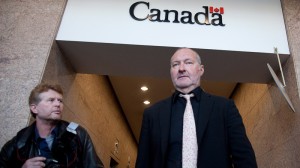Refugee wannabe wants more time.
Randy Quaid needs more time to review bulging Canadian government files on him that are already
eight-centimetres thick, an immigration hearing was told Tuesday.
Quaid’s Vancouver lawyer, Catherine Sas, said the number of pages is growing so rapidly she can’t keep up.
“The government’s disclosure has been voluminous,” said Sas.
The government, which wants to deport Quaid, has filed documents related to vandalism
charges the American actor is facing in the U.S.
The files have a direct bearing on whether Quaid should be deported on the grounds of
“serious criminality” outside of Canada.
“I am not opposed to allowing Mr. Quaid time to prepare,” said lawyer Jim Murray,
acting for the Canadian government’s Ministry of Public Safety.
Quaid says he is the victim of “Hollywood star whackers,” whom he says are out to
get him and his wife, Evi Quaid.
Outside the hearing, Evi Quaid claimed a “murderous” U.S. lawyer is out to “kill” them.
But Evi Quaid was unable to explain why the “star whackers” wouldn’t simply carry out their
plan in Canada if the Quaids were allowed to stay.
Randy Quaid, meanwhile, breathed a visible sigh of relief as King agreed he could have
another month to prepare his case.
“It’s not our first Christmas in Vancouver. I’m looking forward to it,” Quaid beamed.
“I hope it snows.”
The parties are to attend a scheduling conference on Dec. 22.
The government has dropped its objections to Evi Quaid’s presence because her father
was born in
Canada. kspencer@theprovince.com
twitter.com/kentspencer2
Minister Kenney Issues Statement Recognizing Eid al-Adha

The Honourable Jason Kenney, Minister of Citizenship, Immigration and Multiculturalism, issued the following statement recognizing Eid al-Adha:
“Eid-al Adha is held during the month of Dhul Hijja, when Muslims undertake the Hajj – or pilgrimage – to Mecca. It is during the Hajj that Muslims remember and commemorate the trials and triumphs of the Prophet Abraham
“Also known as the Festival of Sacrifice, or the Greater Eid, Eid al-Adha commemorates Abraham’s willingness to submit to Allah’s command to sacrifice his son. When he prepared to do it, Allah revealed to Abraham that his ‘sacrifice’ had already been fulfilled, and replaced his son with a lamb.
“Eid al-Adha is marked by special prayers, visits with family and friends, the exchange of greetings and gifts and the sharing of food with those in need.
“For all Canadians, regardless of their backgrounds, Eid al-Adha provides an excellent opportunity to reflect on the tremendous contributions that Muslims have made to this country’s rich and diverse heritage.
“As Minister of Citizenship, Immigration and Multiculturalism, I extend my best wishes for a happy and healthy Eid al-Adha to all Muslims celebrating today and in the days ahead.”
Take our FREE Online Assessment Today!
Socialize with Abrams & Krochak
Immigration minister says program to bring Afghan translators could be extended
CALGARY – Ottawa may extend its fast-track immigration policy for Afghan translators who help the Canadian Armed Forces and aid workers in Kandahar if troops remain in Afghanistan beyond 2011.
Citizenship and Immigration Minister Jason Kenney said Friday it would make sense to continue the program for as long as such translators work with Canadians.
“The basic principle is any Afghan whose life is at risk because they’ve assisted Canadian Forces or aid workers we’re going to give them fair consideration for expedited immigration to Canada,” Kenney said Friday.
“If there is some kind of extension of a non-combat mission, I’m sure we’ll extend the same principle in the future.”
It was Kenney who originally announced the program to help Afghans who face what he called “extraordinary personal risk” by working with Canadians in Kandahar.
The program was scheduled to end in 2011 when Canada was originally scheduled to end combat operations in Afghanistan. But Prime Minister Stephen Harper confirmed Thursday that Canadian troops will stay in Afghanistan to train the country’s military in a non-combat role after the combat mission ends next July.
Kenney said his priority right now is to deal with the current batch of applicants seeking to come to Canada. He said extending the program is not out of the question.
“We’ll cross that bridge when we come to it. We have applications in the queue we’re reviewing right now.
We’ll focus on those first.”
The application process has been slow and cumbersome.
There have been about 250 applications so far. Each has to be approved by a committee made up of officials from the departments of National Defence, Foreign Affairs, International Development and Immigration and Citizenship.
The committee works with the International Organization for Migration, an intergovernmental agency based in Kandahar.
“Partly it’s because of the security situation. We have an interdepartmental committee that’s asked to meet and review the applications and for a while some of the NGO’s had pulled out of the region,” Kenney said.
“We’ve been able to get that back together now and I think the process is speeding up. We’re on track to receive between 150 and 200 by the time the program is over.”
The delays have been frustrating for the translators.
Applicants require 12 months service to the Canadian mission and a recommendation letter from a senior soldier or diplomat. They also need to meet standard immigration criteria such as criminal, medical and security screening before being allowed to come to Canada.
Interpreters who work with the NATO-led mission live dangerous lives. In the field most wear balaclavas or other face coverings to hide their identity.
Some receive threatening late-night phone calls or a so-called “night letter” nailed to their front door warning them to quit working with NATO. Living with such intimidation is a chilling fact of life for the men.
“We are in danger. Believe me when we go home we are actually looking all around to make sure nobody’s chasing us,” said an interpreter who goes by the name Mojo to protect his identity. Mojo has worked with Canada for a few years, including translating for Corrections Canada officials that help oversee Sarposa Prison.
“It is dangerous. The situation in Kandahar is actually getting worse so we do not know what will happen.”
Take our FREE Online Assessment Today!
Socialize with Abrams & Krochak
Government of Canada Launches Innovative Program to Help Newcomer Youth
LONDON, ONTARIO–(Marketwire – Nov. 17, 2010) – The Government of Canada is investing more than $1.6 million to help newcomer youth and their families in London, Ed Holder, Member of Parliament for London West announced today, on behalf of the Honourable Jason Kenney, Minister of Citizenship, Immigration and Multiculturalism.
The Settlement Workers in Schools (SWIS) program provides newcomer families with an interactive orientation to the Ontario school system as well as referrals to settlement agencies and other community support services. Settlement workers also engage with students, parents and school staff to increase cultural awareness and sensitivity in London area schools.
“The Government of Canada is helping newcomer youth and their families succeed,” said MP Holder. “This investment will help improve the lives of young newcomers to London. When we invest in our youth, we invest in the future of Canada.”
“Our government knows that helping newcomer families get settled is key to their success,” said Dr. Eric Hoskins, Ontario Minister of Citizenship and Immigration. “Settlement resources need to be easily accessible. By making settlement workers available in schools in the London area, we are making sure that the needs of our newcomer families are met.”
“This is a great example of how a community partnership can help students and their families who are new to Canada adjust to their new home in London,” said Jeffery Robinson, Learning Coordinator at the Thames Valley District School Board. “Schools are a hub for a community and a natural meeting place for the children and parents of new Canadians.”
Since 2005, the Government of Canada has more than tripled its annual spending on settlement services for newcomers in Ontario. For 2010-11, the Government of Canada is allocating $428 million in Ontario for settlement services for newcomers, such as language training, job search workshops and placing settlement workers in schools.
Archives
- January 2024
- November 2023
- July 2023
- June 2023
- May 2023
- January 2023
- November 2022
- April 2022
- March 2022
- February 2022
- October 2021
- June 2021
- April 2021
- October 2020
- September 2020
- June 2020
- May 2020
- April 2020
- March 2020
- December 2019
- January 2019
- December 2018
- November 2018
- August 2018
- June 2018
- April 2018
- January 2018
- December 2017
- November 2017
- April 2017
- January 2017
- December 2016
- November 2016
- October 2016
- September 2016
- August 2016
- August 2015
- January 2015
- December 2014
- November 2014
- June 2014
- April 2014
- March 2014
- February 2014
- December 2013
- May 2013
- April 2013
- January 2013
- December 2012
- August 2012
- June 2012
- March 2012
- January 2012
- September 2011
- August 2011
- July 2011
- June 2011
- February 2011
- January 2011
- December 2010
- November 2010
- September 2010
- August 2010
- July 2010
- June 2010
- May 2010
- April 2010
- March 2010
- February 2010
- January 2010
- December 2009
- November 2009
- October 2009
- September 2009
- August 2009
- August 2008
- July 2008
- June 2008
- May 2008
- April 2008
- March 2008
- February 2008
- January 2008

